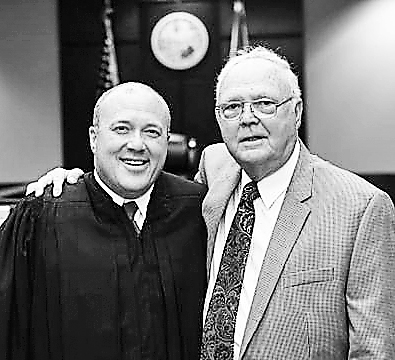Q. Judge Smith, how has law practice changed since you started?
A. I became a lawyer in 1987. As a newbie, my boss tasked me with legal research, writing, and reviewing documents that the parties had produced for lawsuits. Let’s compare how I did that work then and now.
Nineteen-Hundred-and-Eighty-Seven
1987 was nearing the end of an era. Many law firms still used typewriters. We used white-out to correct typos. Cutting-edge offices used computers as word processors. If the internet existed, I was blissfully unaware.
In 1987, legal research involved books. My law firm spent thousands of dollars per year on its in-house library. We maintained and updated complete sets of law books. I used the local courthouse library if I needed a book that my law firm didn’t have.
When I began practicing law, I couldn’t type. In 1987 I dictated my letters, motions, and legal memoranda. After my secretary typed them out, I edited them.
At the time, document scanning and using computer algorithms to review documents would have sounded like science-fiction. Thus, I spent many hours reading thousands of papers to sift the wheat from the chaff. Similar to finding the needle in the haystack.
Back then, lawyers served most motions and legal memoranda by hand delivery, U. S. mail, or facsimile. Communicating and sending attachments by email didn’t exist. Zoom and Facetime were unimaginable!
In 1987, judges conducted all hearings and trials in person. Eventually, the rules of procedure changed to accommodate short telephonic hearings for minor matters.
Two-Thousand-and Twenty-Three
During the intervening years, I taught myself how to type. I no longer dictate anything. Instead, I draft and edit most of what I write. The lawyers or my judicial assistant write everything else subject to my editing. We use personal computers or laptops to do the work.
Today few lawyers and law firms maintain law libraries. Instead, we do our research using internet services. At the touch of my keyboard, I can find the answer to most legal questions in moments.
People regularly scan papers and use computer algorithms to review the documents parties produce in lawsuits. Here, technology saves tons of time and money compared to manual reviews.
Now, people rarely use facsimile machines. Instead, most folks make deliveries of legal papers by email, internet portals, Federal Express, U.P.S., and U. S. mail.
Since the pandemic hit in 2020, courts have embraced the use of Zoom to conduct hearings and civil bench trials. This sea change has been popular with lawyers, witnesses, and clients because of its convenience and cost savings. During the 18 months I presided over Leon County circuit civil cases, I conducted every hearing and bench trial by Zoom. The only in-person work I did was jury selection and jury trials.
Practicing law has dramatically changed since 1987, and you can only imagine how much more things will change over the next 35 years. I’ll let you know if I’m still writing columns in 2057!
The Honorable J. Layne Smith is a Circuit Judge, bestselling author, and public speaker. Send your questions to askjudgesmith@gmail.com.



